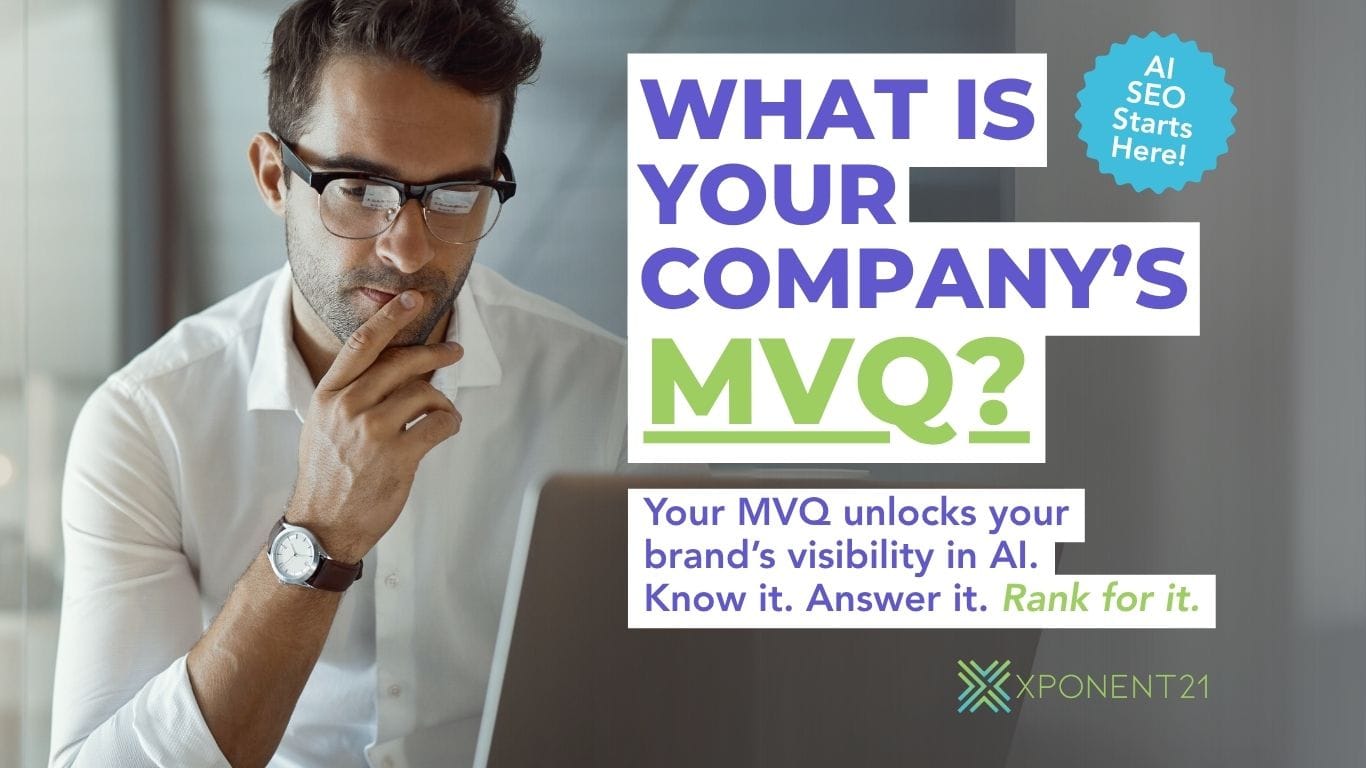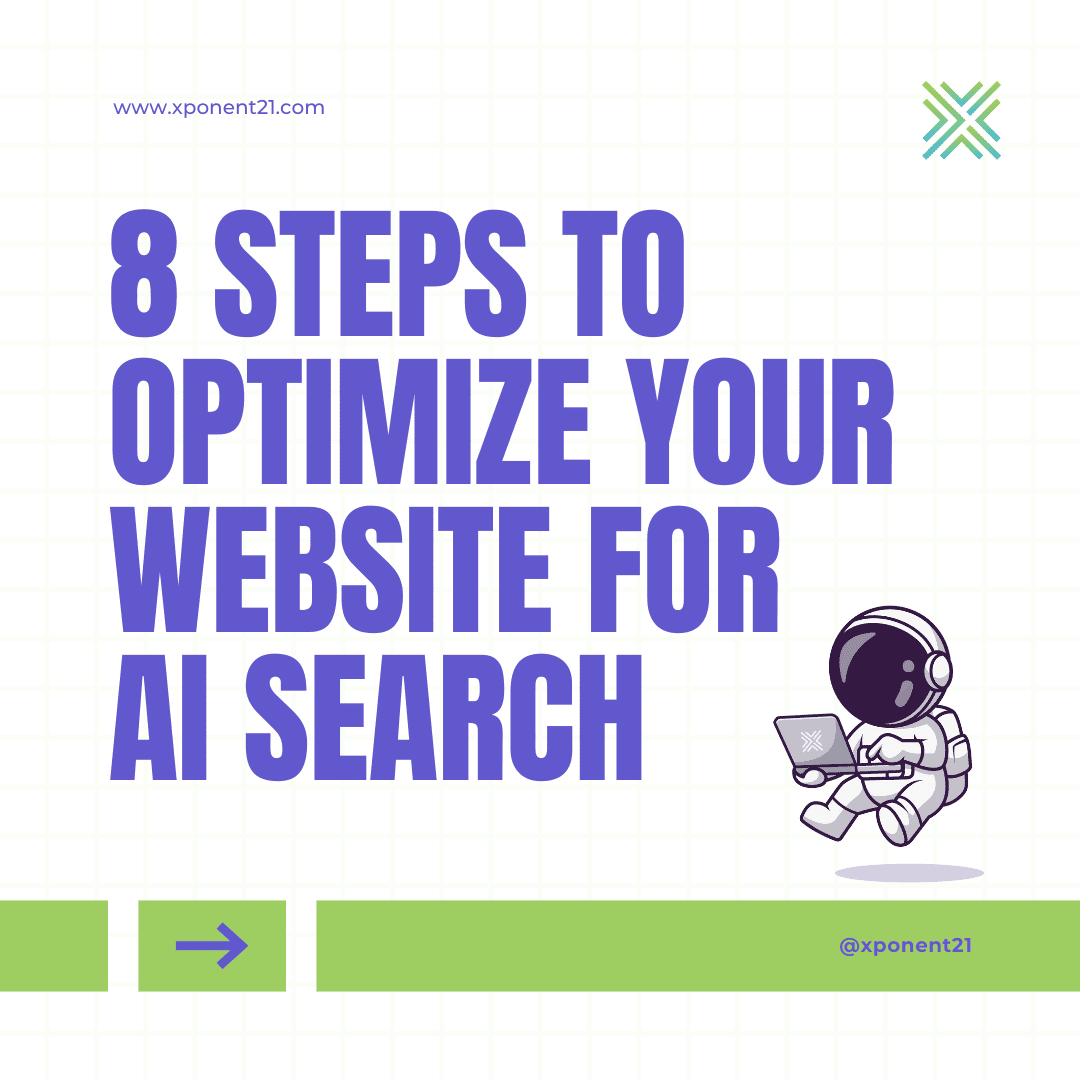
We’re living in the era of answer engines, not search engines. If your brand isn’t authoring the best answers, you’re invisible to your next would-be customer. It’s no longer enough to rank for broad, high-volume keywords. Today’s most effective content strategies are built around answering the right questions—specifically, your brand’s Most Valuable Questions (MVQs).
Contents
- Why Short-Tail Keyword Optimization Is Obsolete
- What Are MVQs—and Why Do They Matter?
- The Anatomy of the Best Answers
- Why the MQV Strategy Works—And Why It Pays Off
- AI Is Empowering Explorers—You Need to Be Their Guide
- Explore the MVQ Finder GPT, Created by Xponent21
- Recommended Reads from the Xponent21 Blog
Why Short-Tail Keyword Optimization Is Obsolete
Historically, brands fought to rank for short-tail keywords like “accounting software” or “window tinting.” But that’s no longer how people search and SEO agencies that continue to sell this strategy are either sleeping or they are scammers.
Today, both consumers and corporate buyers turn to Google, ChatGPT, Perplexity, and other AI-powered assistants to ask complete, contextualized questions. They want answers that reflect their unique situation:
- “What’s the best accounting platform for managing invoices for a small consulting firm?”
- “Is ceramic window film worth the cost for a retail storefront with west-facing windows?”
These aren’t just queries—they’re opportunities. Every time someone types or speaks a question like this, they’re inviting a solution into their world. If your brand isn’t visible in those moments, you’re invisible when it matters most.
What Are MVQs—and Why Do They Matter?
Most Valuable Questions (MVQs) are the specific, often emotionally loaded or financially significant questions your best customers ask right before they make a purchasing decision. They’re not generic FAQs. They’re real-life, situation-specific queries that reveal a clear need—and a strong intent to act.
Understanding and identifying your brand’s MVQs allows you to:
- Show up when your audience is actively seeking solutions.
- Build trust by demonstrating expertise and relevance.
- Earn visibility in AI Overviews, featured snippets, and “people also ask” results.
- Drive high-converting traffic by answering the exact questions your buyers are asking.
Think about questions like:
- “What’s the best payroll software for a 10-person construction company?”
- “How do I stop roof leaks without replacing the whole thing?”
- “Can you get dental implants if you have bone loss?”
- “Is there a video agency that travels to film customer testimonials?”
- “What’s the fastest way to get cash flow help before payroll hits?”
Each of these signals urgency, purchasing intent, and a real problem someone is trying to solve—right now. If your brand has the best answer, you don’t just show up—you become the trusted solution.
The Anatomy of the Best Answers
Creating visibility in AI-powered search isn’t about stuffing in keywords anymore. It’s about writing the single best answer on the internet—the one an AI would confidently quote in front of millions of users. And to get there, you need to nail nearly every dimension of what makes a great answer.
Generative search engines are increasingly selective. They’re not pulling from average blog posts or thin content. They’re favoring responses that are thorough, confident, and structurally sound—answers that reflect true authority and helpfulness.
To qualify, your content must perform exceptionally well across a range of criteria:
- Articulates the Problem: Demonstrates deep understanding of the issue.
- Explains Why It Matters: Adds context, urgency, and stakes.
- Offers Practical Advice: Clear, actionable steps users can take.
- Shares Valuable Comparisons: Helps users understand options.
- Makes Confident Judgements: Establishes authority with decisive language.
- Includes Visual Aids: Enhances clarity and engagement with diagrams, charts, or visuals.
- Augments with Audio/Video: Leverages multimedia to meet different learning styles.
- Builds Confidence in the Path Forward: Reassures the user that they’re in good hands.
- Links to Related Content: Strengthens topic authority and reinforces next steps.
- Addresses Cost/Benefit: Frames the value and urgency of the solution.
- Aligns with User Intent: Speaks to the user’s current decision stage.
- Anticipates Objections: Resolves doubts before they surface.
To be surfaced in an AI Overview, you’re not being judged on whether your content is “good enough.” You’re being graded—implicitly and holistically—across these dimensions. And you need to earn near-perfect marks. Because if your answer falls short on even a few of these points, AI tools will pull from someone else who did get it right.
This is the new standard: write for usefulness, completeness, and clarity—not just for keywords.
Help the user see themselves in the solution, and you won’t just rank—you’ll convert.
Why the MQV Strategy Works—And Why It Pays Off
The way people search has evolved, and the way AI tools generate answers has evolved even faster. Search is no longer just about matching keywords. It’s about matching meaning, context, and intent—and surfacing content that delivers complete, confident solutions.
AI tools like Google’s SGE and AI Mode, ChatGPT, and Perplexity don’t just look for exact phrases—they look for patterns of relevance, authority, and completeness. They synthesize answers across multiple sources, but they weight their outputs toward the content that:
- Appears to solve the whole problem
- Uses clear structure and confident language
- Reinforces expertise with supporting signals (like schema, citations, multimedia, and interlinking)
When your content is structured around MVQs—real, specific, purchase-driven questions—it sends all the right signals:
- Relevance: You’re addressing exactly what the user wants to know.
- Authority: You demonstrate unique insight, supported by examples, data, or experience.
- Completeness: Your answer resolves the query fully—no need to look elsewhere.
That combination tells AI, “This is the answer.”
But here’s where it gets even more powerful: MVQ content doesn’t just win visibility—it wins buyers. These aren’t top-of-funnel visitors. These are users in moments of active need, searching for guidance, clarity, and solutions. When you answer their question better than anyone else:
- You earn attention in the most competitive digital real estate: AI summaries, snippets, featured answers.
- You build instant trust by showing, not telling, that you understand the problem.
- You accelerate conversions—because when people feel understood and guided, they act.
And unlike pay-per-click ads, there’s no ceiling. A great MVQ answer ranks for hundreds of related queries, gets cited across platforms, and lives on as a compound asset that works 24/7.
This is how attention turns into trust—and trust turns into revenue.
Not by being everywhere, but by being the best answer in the places that matter most.
Addressing Common Objections
You might be thinking, “We don’t have the time or team to do all this,” or “Is this really worth the extra effort?” These are valid concerns—but here’s the reality: doing the minimum is no longer enough to win in search. AI doesn’t reward average—it elevates the best. The good news is, you don’t need to boil the ocean. Start with just a few of your Most Valuable Questions and build from there. Every great answer you author increases your chances of being cited by AI tools, discovered by ideal buyers, and remembered as the brand that gets it. The ROI compounds with every piece of content that earns trust and drives a lead.
AI Is Empowering Explorers—You Need to Be Their Guide
AI has created a new class of searcher: the explorer. These users are thoughtful, context-rich, and ready to discover something new if it aligns with their needs. They’re not typing “SEO agency near me.” They’re asking:
“Which SEO firms specialize in AI search optimization and have experience with national brand strategy?”
And they’re relying on AI tools to narrow the field. If you haven’t authored a great answer to that question, you’ll never be in the running.
Achieving visibility to these explorers is now the most important part of your content strategy. If you’re not shaping how AI describes your brand, it’s shaping your visibility for you—and probably leaving you out of the conversation.
Explore the MVQ Finder GPT, Created by Xponent21
To make this process even easier, we created the MVQ Finder GPT, a custom tool designed to help you identify your Most Valuable Questions in seconds. Instead of spending days analyzing transcripts, keyword data, and competitor content, the MVQ Finder GPT quickly reviews customer language, search patterns, and gaps to deliver a ranked list of the questions that matter most to your audience. With this insight, you’ll know exactly where to focus your content efforts to earn trust, build authority, and secure top placement in both traditional and AI-driven search results.
Recommended Reads from the Xponent21 Blog
If you’re ready to dive deeper, these articles expand on the strategy behind MVQs and AI-powered visibility:
- How to Rank in AI Overviews: The New Front Page of Search
A guide to optimizing your content for Google’s generative search results. - The AI SEO Content Accelerator: A 14-Step Framework to Own the Internet
Our proprietary framework for dominating AI-driven search. - How Much Does It Cost to Hire an SEO Company?
A transparent breakdown of SEO pricing, tiers, and what it really takes to win today. - From Keywords to Conversations: Building a Content Strategy for AI Search
How to shift your content plan from keyword-driven to question-driven.
Want to understand why these shifts are happening or how our strategy actually works? Check out this deep read on my personal website, WillMelton.com: The Confidence Economy: Why Search Is Changing, and What AI Really Wants from You.
Want to know which questions matter most to your brand? Start by asking your customers—or better yet, let us help you discover the MVQs driving your next generation of growth.
→ Run a Free AI SEO Audit and find out how well your brand is positioned to be the answer.



